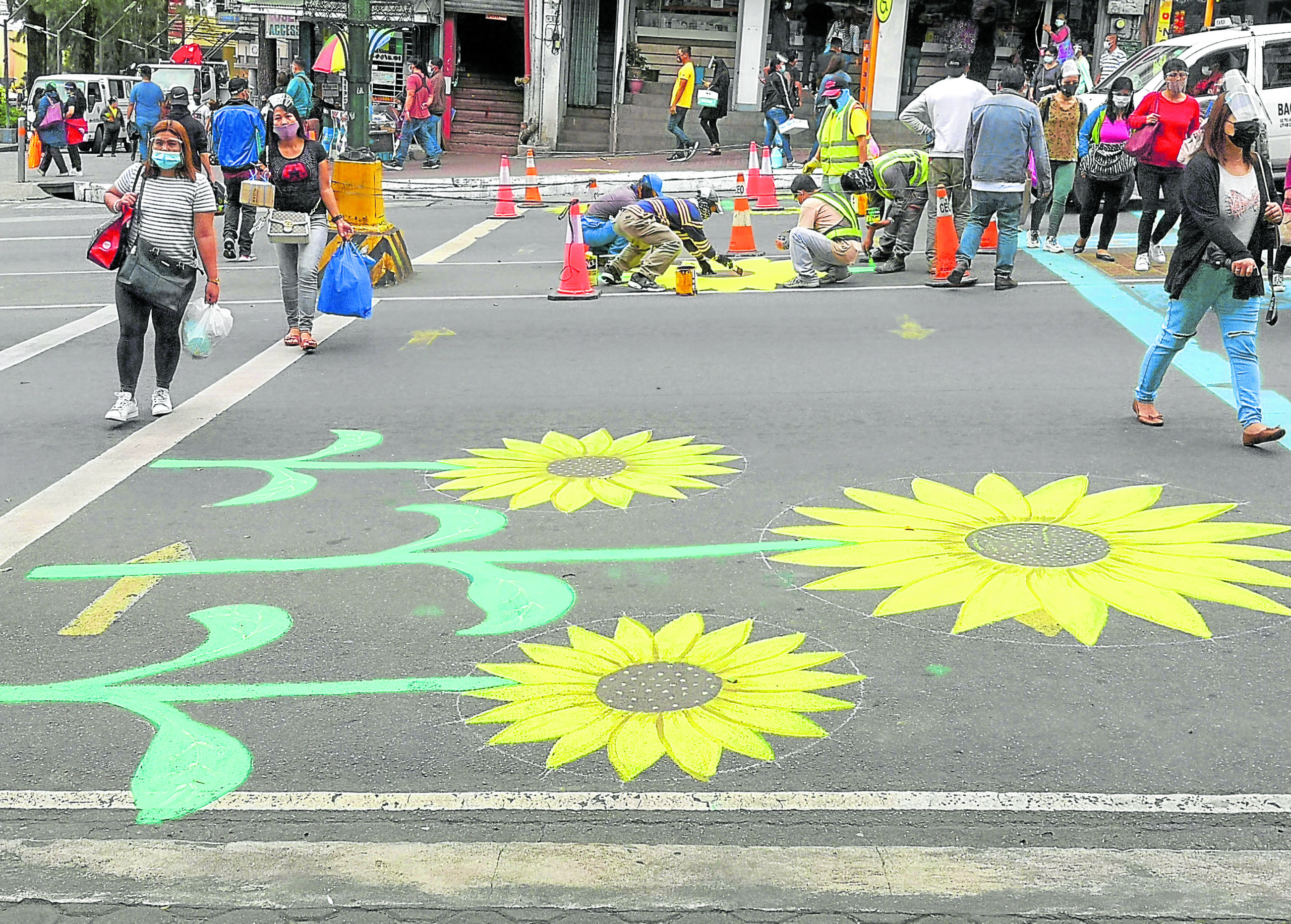
ROAD ART A pedestrian lane on Session Road in Baguio City is painted with sunflowers to hopefully cheer residents after the summer capital postponed its crowd-drawing flower festival due to the Covid-19 pandemic. —EV ESPIRITU
BAGUIO CITY—Restrictions at the borders of Baguio and its five neighboring towns in Benguet province will be tightened again as the Cordillera is expected to be placed on general community quarantine (GCQ) starting Feb. 1, officials said.
The Department of Health (DOH) last week endorsed the stricter quarantine status for the region following the surge in cases of the new coronavirus disease (Covid-19) and its more contagious variant first discovered in the United Kingdom (UK).
But the Inter-Agency Task Force for the Management of Emerging Infectious Diseases has yet to issue guidelines for the new quarantine classification next month.
Medical clearances
Health authorities said they were seeing evidence that some of Baguio’s Covid-19 patients might have ties to people infected with the UK variant of Covid-19 in Bontoc, Mountain Province, and in La Trinidad, Benguet.
A map tracking the movement of 12 patients in Bontoc and another in La Trinidad, has found connections with Baguio cases, Baguio City Mayor Benjamin Magalong said during a meeting with local officials this week.
He said the possibility that the Covid-19 variant had reached the city required a quick response, such as the stricter border regulations.
Residents of Baguio, La Trinidad and the towns of Itogon, Sablan, Tuba and Tublay, who cross borders for work or essential goods and services, must again secure medical clearances to show that they do not have the disease.
Magalong and Mayors Romeo Salda (La Trinidad), Victorio Palangdan (Itogon), Manuel Munar Jr. (Sablan), Clarita Sal-ongan (Tuba) and Armando Lauro (Tublay) imposed the restrictions until Feb. 15, or unless developments would require an extension.
Baguio is under a modified general community quarantine (MGCQ), the most relaxed form of quarantine, and was once placed on GCQ at the onset of the pandemic last year.
Struggling to survive
A second GCQ could be the “final nail on the coffin” of small enterprises that could permanently close after struggling to survive, businessmen said.
“All restrictions are bad for retail and brick and mortar businesses,” said Michael del Rosario, who owns one of the city’s oldest supermarkets, as well as a chain of hotels and restaurants.
A new GCQ “could be a turning point for some businesses on the brink of closure,” he said.
Many local businessmen lost capital and had to let go of employees due to the hard lockdown imposed on Luzon and the subsequent quarantine in 2020. Some businesses managed to keep afloat until Baguio reopened its borders to tourists in October.
Baguio City Administrator Bonifacio dela Peña said 600 more beds had been put up for Covid-19 patients as two major hospitals reached full capacity.
As of Tuesday, Baguio had 581 active Covid-19 cases. It has recorded a total of 4,870 cases, with 90 fatalities.
No lockdown
In Cebu City, Mayor Edgardo Labella said the local government would not seek a higher quarantine classification or impose a lockdown despite the recent increase in Covid-19 infections.
Labella said the city government was on top of the situation and that there was no need to panic.
“I don’t see any compelling reason why we should go back to general community quarantine. After all, our modified GCQ is controlled,” he said.
“We are doing our best so people won’t be complacent. Even if we are under MGCQ, we are still very vigilant,” he added.
Cebu City has been under MGCQ since September after it contained the spread of Covid-19. But early this month, it had another surge in coronavirus cases.
The city recorded 81 active Covid-19 cases on Dec. 27, 2020, but the number ballooned to 986 a month later. —WITH REPORTS DALE ISRAEL AND NESTLE SEMILLA

